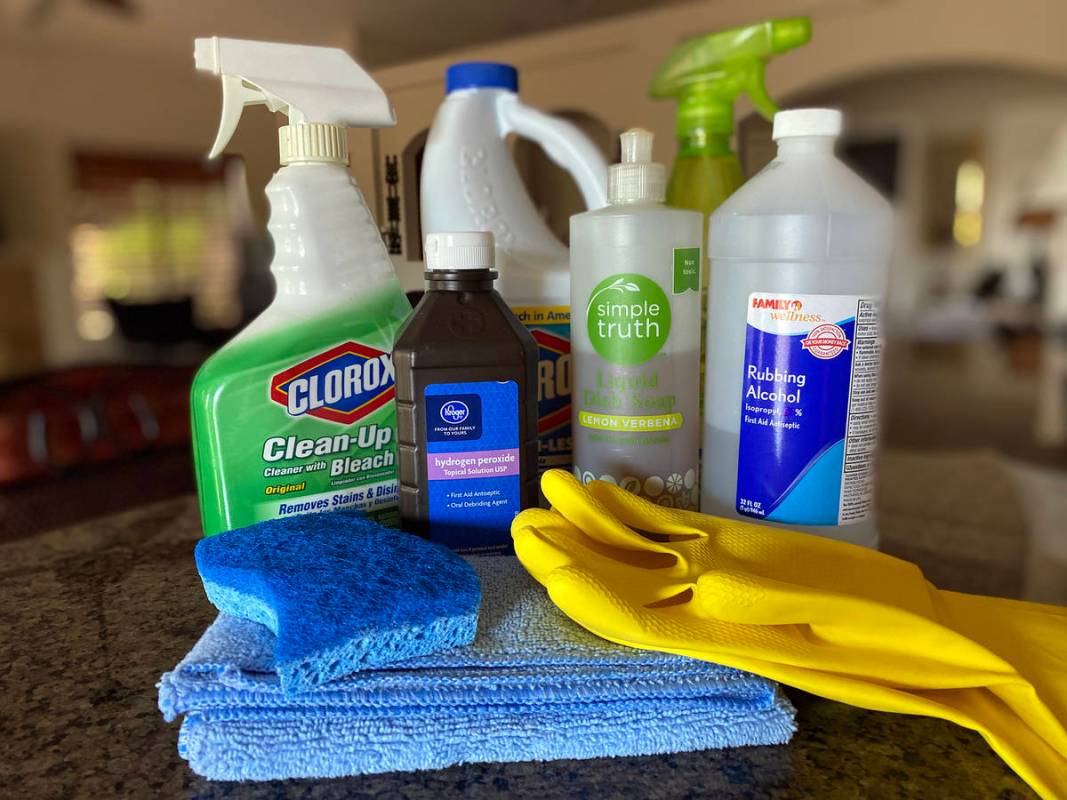
As COVID-19 persists in our lives, so too is the manner in which we’re combating it. Best practices for business cleaning and sanitizing during the pandemic are in place from CDC, FDA, EPA, and OSHA. Residentially, we should be upping our disinfecting game as well.
Advice from professional cleaners is a good place to start. Mary Kuzminsky-Yesayan, co-owner of Angels’ House Cleaning Services of Bullhead City, Arizona, said, “Our main goal is to keep our customers and employees safe and healthy. The crew members are instructed to disinfect high-touch areas such as light switches, handrails, door handles, restroom faucets and soap dispensers, and devices such as phones and remote controls.”
For these surfaces her crews use isopropanol alcohol and a microfiber cloth. The CDC.gov confirms that, “Alcohol solutions with at least 70 percent alcohol,” may be used to clean hard surfaces, including electronics.
As for kitchens and bathrooms, Kuzminsky-Yesayan uses Clorox Clean Up, a bleach-based sanitizer. Likewise, CDC.gov recommends a homemade bleach solution mix of: 5 tablespoons (one-third cup) bleach per gallon of room temperature water OR 4 teaspoons bleach per quart of room temperature water.
Hydrogen peroxide may also be used as a home disinfectant. Per CDC.gov, “Commercially available 3% hydrogen peroxide is a stable and effective disinfectant when used on inanimate surfaces.” Even more, the CDC sites—“Hydrogen peroxide was effective in spot-disinfecting fabrics in patients’ rooms.”
As a precaution, follow manufacturer’s recommendations for your cleaner of choice and test a small section to be sure it doesn’t damage your surface. FYI, never mix cleaning chemicals together, especially ammonia and bleach, which releases a potentially deadly gas. For more in-depth advice, checkout the CDC.gov page “Cleaning And Disinfecting Your Home.”
Technology is cleaning up its act as well. UV wands use ultraviolet light, a type of electromagnetic radiation, to sterilize surfaces. Notably, hotels including all MGM properties in Las Vegas offer The Stay Well Program—premium rooms that are wellness-focused. Among the guest room features is Stay Well’s “Cleaning Protocol” which uses a “state-of-the-art UV wand cleaning tool, which helps neutralize bacteria, viruses and other microbes” (wyndhamhotels.com).
As a result, surfaces, especially remote controls, can be sterilized without exposure to harsh chemicals.
As for UV wands marketed for home use, many germicide experts are skeptical.
The latest in high-tech cleaning are disinfection robots that drive autonomously around contaminated spaces like hospital rooms.
“Robots that use ultraviolet technology to sanitize areas have been deployed globally to minimize the exposure of patients and health workers to COVID-19.” (tectales.com). With iRobot’s Roomba as a predecessor, could a sanitizing “Rosie the Robot” be available in the not-so-distant future? I bet my feather duster it will.
Until then, how can we sanitize our homes without the use of harsh chemicals?
Microban, triclosan, triclocarban—these antimicrobial chemicals raise question about their effects on humans, especially with long-term use. Happily, there are natural approaches. Washing surfaces with soap and water is the first step. Now the surface is ready for a sanitizer that’s biodegradable and won’t leave harmful residue. Two I’ve already sited already—70 percent rubbing alcohol and hydrogen peroxide. Use a spray bottle with either product, do not mix, and wipe thoroughly.
A third natural sanitizer is Thymol—a component of the essential oil of thyme. Thymol meets the EPA’s criteria for use against COVID-19. Seventh Generation offers a line of disinfecting products that feature this active ingredient.
As for sunlight and heat, according to the World Health Organization, “there is no evidence that sunlight kills the new coronavirus,” yet other studies suggest the contrary. Given this conflicting information and our extreme desert sun and heat, common sense tells me if it’s hot enough to fry an egg on the sidewalk … well, you can decide for yourself.
Norma Vally is a seasoned veteran of home improvement; her career includes four seasons as host of Discovery Home Channel’s Emmy-nominated series “Toolbelt Diva.” A columnist and author, Vally splits her time in Southern Nevada, Los Angeles and New York City. Follow her on Facebook at Norma Vally “Toolbelt Diva” and visit her at www.normavally.com. Email norma@normavally.com.